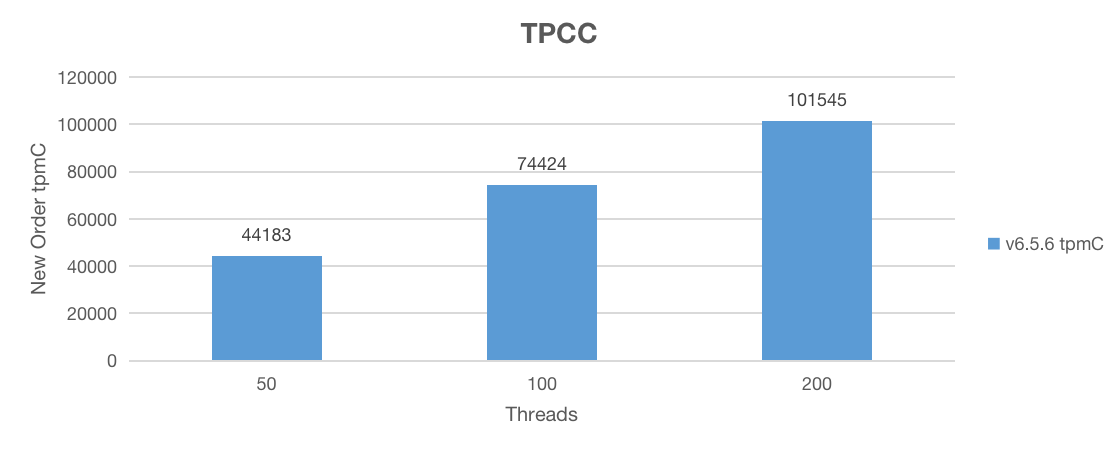TiDB Cloud TPC-C Performance Test Report for TiDB v6.5.6
This document provides the TPC-C performance test steps and results for a TiDB Cloud Dedicated cluster with the TiDB version of v6.5.6. This report can also be used as a reference for the performance of TiDB Self-Managed v6.5.6 clusters.
Test overview
This test aims at showing the TPC-C performance of TiDB v6.5.6 in the Online Transactional Processing (OLTP) scenario.
Test environment
TiDB cluster
The test is conducted on a TiDB cluster with the following settings:
Cluster type: TiDB Cloud Dedicated
Cluster version: v6.5.6
Cloud provider: AWS (us-west-2)
Cluster configuration:
Node type Node size Node quantity Node storage TiDB 16 vCPU, 32 GiB 2 N/A TiKV 16 vCPU, 64 GiB 3 1000 GiB
Benchmark executor
The benchmark executor sends SQL queries to the TiDB cluster. In this test, its hardware configuration is as follows:
- Machine type: Amazon EC2 (us-west-2)
- Instance type: c6a.2xlarge
Test steps
This section introduces how to perform the TPC-C performance test step by step.
In the TiDB Cloud console, create a TiDB Cloud Dedicated cluster that meets the test environment requirements.
For more information, see Create a TiDB Cloud Dedicated cluster.
On the benchmark executor, connect to the newly created cluster and create a database named
tpcc.To connect to the cluster, see Connect to TiDB Cloud Dedicated via Private Endpoint.
To create the
tpccdatabase, execute the following SQL statement:CREATE DATABASE tpcc;Load TPC-C data to the
tpccdatabase.The test in this document is implemented based on go-tpc. You can download the test program using the following command:
curl --proto '=https' --tlsv1.2 -sSf https://raw.githubusercontent.com/pingcap/go-tpc/master/install.sh | shRun the following
go-tpc tpcccommand to import 1,000 warehouses to thetpccdatabase. Replace${HOST},${THREAD}, and${PASSWORD}with your actual values. This document conducts three tests with the${THREAD}value of50,100, and200.go-tpc tpcc --host ${HOST} --warehouses 1000 prepare -P 4000 -D tpcc -T ${THREAD} --time 2h0m0s -p ${PASSWORD} --ignore-error
To ensure that the TiDB optimizer can generate the optimal execution plan, execute the following SQL statements to collect statistics before conducting the TPC-C test:
ANALYZE TABLE customer; ANALYZE TABLE district; ANALYZE TABLE history; ANALYZE TABLE item; ANALYZE TABLE new_order; ANALYZE TABLE order_line; ANALYZE TABLE orders; ANALYZE TABLE stock; ANALYZE TABLE warehouse;To accelerate the collection of statistics, execute the following SQL statements before collecting:
SET tidb_build_stats_concurrency=16; SET tidb_distsql_scan_concurrency=16; SET tidb_index_serial_scan_concurrency=16;Run the following
go-tpc tpcccommand to conduct stress tests on the TiDB Cloud Dedicated cluster. For each concurrency, the test takes two hours.go-tpc tpcc --host ${HOST} -P 4000 --warehouses 1000 run -D tpcc -T ${THREAD} --time 2h0m0s -p ${PASSWORD} --ignore-errorExtract the tpmC data of
NEW_ORDERfrom the result.TPC-C uses tpmC (transactions per minute) to measure the maximum qualified throughput (MQTh, Max Qualified Throughput). The transactions are the NewOrder transactions and the final unit of measure is the number of new orders processed per minute.
Test results
The TPC-C performance of v6.5.6 in the test environment is as follows:
| Threads | v6.5.6 tpmC |
|---|---|
| 50 | 44183 |
| 100 | 74424 |
| 200 | 101545 |
